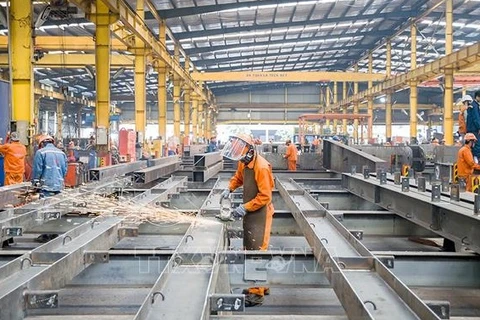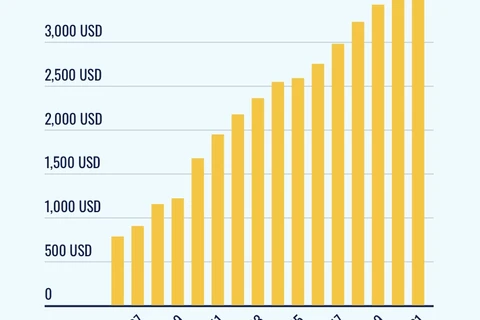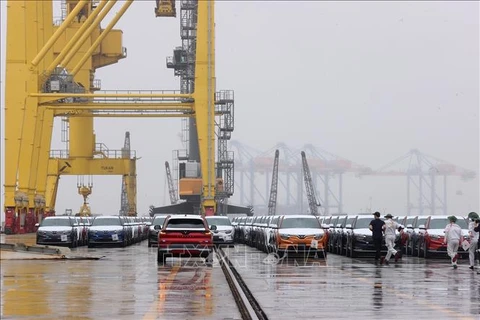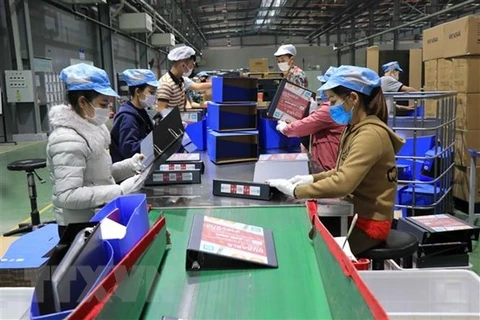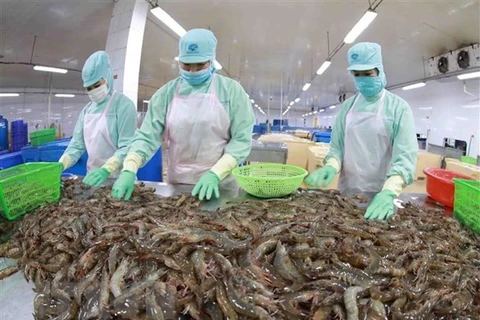Hanoi (VNA) – In its December Vietnam Macro Monitoring report, the World Bank (WB) said the two drivers of economic growth, namely exports and domestic demand, are moderating, some of the pressure on the Vietnamese currency, the VND, has been alleviated.
Capital registered for manufacturing surges
According to the report, after a big jump in October, total FDI commitment moderated to 2.7 billion USD in November, down by 27.9% month on month (m/m) and 1.9% year on year (y/y). Notwithstanding this decline, commitment in manufacturing rebounded sharply, increasing by 158% m/m and 50% y/y.
Over the first 11 months of 2022, the total FDI commitment reached 25.1 billion USD, down by 5% compared to a year earlier. FDI disbursement remained strong, growing by 14.4% y/y in November and 15.1% y/y for the first 11 months of 2022.
The industrial production index increased by 5.3% y/y in November, compared to the 6.3% in October. This is the lowest since February 2022. Part of the deceleration is attributed to the high-base effects. Indeed, industrial production index rebounded from 1.8% y/y in October 2021 to 8.2% y/y in November 2021 as the country reopened its door following an extended COVID-19 lockdown. In addition, weak external demand could be another important contributor, as demand by major exports markets has been slowing down.
Retail sales’ growth slowed from 20.7% y/y in October to 17.5% y/y in November, a third month of moderation. On the one hand, this moderation is partly attributed to the effects related to the COVID-19 lockdowns in Q3 of 2021. On the other hand, the consumption rebound experienced in the first three quarters of the year appears to be fading.
Sales of goods increased by 10.7% y/y, compared to pre-pandemic growth rates of around 12% y/y. The sales of catering and accommodation exceeded the pre-pandemic level by 5.3% in November 2022. However, travelling services remained 37% lower than in November 2019.
The Consumer Price Index (CPI) inflation ticked up slightly from 4.3% in October to 4.4% in November. Core inflation, which excludes food, energy, and price-controlled items (education and health services), continued to accelerate from 4.5% in October to 4.8% in November, a new record high.
Further flexibility in exchange rates should be allowed
The WB said the VND appreciated slightly in November (0.8%), compared to the 9.1% accumulated depreciation since the end of 2021. This appreciation was mainly attributed to a general weakening of the USD in international markets. In fact, all major currencies and currencies of Vietnam’s neighbor countries appreciated against the US dollar in November 2022. The State Bank of Vietnam’s increase of key policy interest rates by 200 basis points in September and October 2022 also contributed to easing depreciation pressure on the VND.
The two drivers of economic growth, exports and domestic demand, are moderating. External demand is softening, weighing on exports. The post COVID-19 consumption rebound appears to be fading, and tighter domestic financial conditions and rising inflation could affect domestic demand going forward.
Given tight global financial conditions and weakening external demand, Vietnamese monetary authorities could consider allowing further flexibility in the exchange rate to accommodate external shocks.
This could be complemented with judicious use of reference interest rates and prudent use of direct foreign exchange interventions to ensure foreign exchange reserves are protected. Fiscal and monetary policy coordination will be critical to ensure price stability in light of accelerating domestic core inflation.
A more prudent and prioritised expenditure strategy should focus on ensuring investments in human capital and resilient and green infrastructure to help bolster economic potential and resilience, the WB noted in the December report./.

